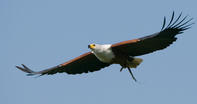
Name
African Fish Eagle (Haliaeetus vocifer)Appearance
The African fish eagle is a fairly large eagle with a mostly brown body and large powerful, black wings. The head, breast, and tail are snow white and the featherless face is yellow.African Fish Eagle Diet
As its name suggests, it feeds mostly on fish, gracefully swooping down to the water surface to grab a fish with its talons. Catfish and lungfish are caught most frequently. Larger prey is eaten on the ground next to the water.
In some areas, it preys on flamingos and other water birds. It is also known to eat carrion and is classified as a kleptoparasite (it steals prey from other birds). Goliath herons are known to lose a percentage of their catch to fish eagles.
African Fish Eagle Behaviour
African fish eagles are known for their distinct calls, which are often heard before the birds can be seen. So well known and clear is the call of this bird that it is often known as ‘the voice of Africa’.
When in flight or perched they emit a high-pitched whistling sound similar to the American bald eagle. When near the nest its call is more of a ‘quock’ sound - the female is a little shriller and less mellow than the male.
The African fish eagle is usually seen in pairs even outside the breeding season, and share kills made by either of them. They spend more time perched than flying, and usually settle for the day by 10am, although they will prey at any time of the day.
African Fish Eagle Habitat
The African fish eagle is frequently seen sitting high in a tall tree from where it has a good view of its territory, either a stretch of river, lakeshore or coastline.
A breeding pair, near a lake with an abundant food supply, may require less than a square mile of water to find enough food. Next to a small river, they may require a stretch of 15 miles or more. Some African fish eagles move around to avoid the wetter weather, whereas others remain at the same place year-round.
 At the Blyde River Canyon (also known as Motlatse Canyon) you can spot wildlife such as troops of baboon, vervet monkey and dassies, which f...
At the Blyde River Canyon (also known as Motlatse Canyon) you can spot wildlife such as troops of baboon, vervet monkey and dassies, which f... The little sparrow-hawk, the Lowveld’s smallest raptor, is the same size as a dove....
The little sparrow-hawk, the Lowveld’s smallest raptor, is the same size as a dove....